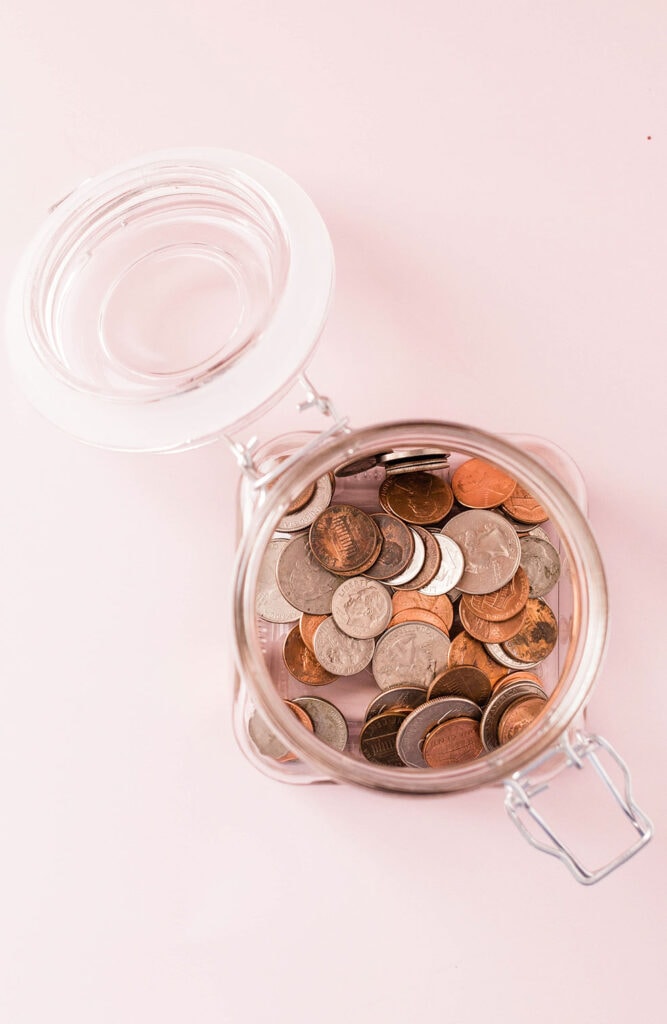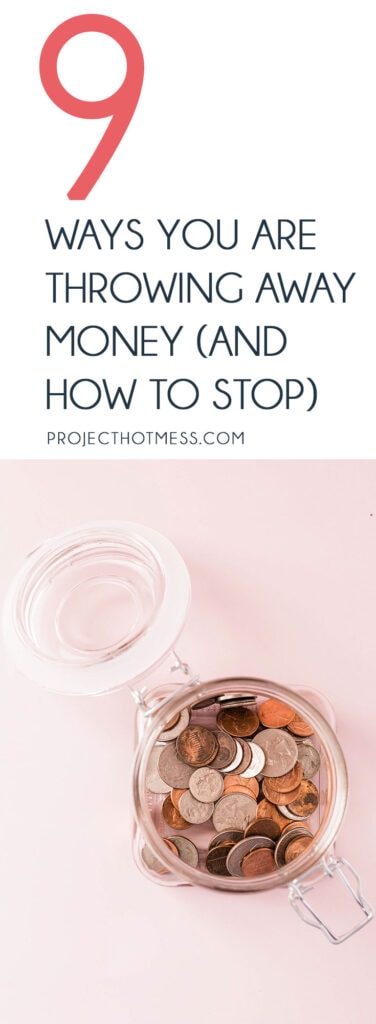9 Ways You Are Throwing Away Money (And How To Stop)
There’s no denying I love money. That’s not a bad thing, in fact I think by loving money I actually respect it more. Which is why the one thing I really despise is throwing away money.
Waste drives me bonkers, especially if I can’t tell you where the money has gone.
Which is why it is so important to eliminate the number of ways you are throwing away money.
After all, we all want more money, we all having things we’d rather spend our money on than throwing it away, so making a few simple tweaks can make a huge difference.
** Updated to add even more ways to stop throwing away money!**
Be sure to grab our Free Mini Finance Planner so you can take control of your finances and acheive your financial goals:

1 – Letting Fresh Produce Spoil
How many bowls of fruit or soggy bags of salad leaves have you thrown out this year?
It’s easy to do.
You go shopping and are all motivated to eat healthy, buy up big in the fresh produce section only to let that food sit in the fridge a little longer than you intended (okay, maybe a week or two longer) and before you know it you’re throwing money in the bin.
You don’t have to stop buying fresh produce. You just have to be a bit more savvy about how you use it.
First of all, know how to store your fresh produce properly. It can be the difference between your food lasting a few days or lasting a week.
Another thing you can do is to just buy what you need for the next few days.
Which means you’ll have to shop more frequently (which leads to more temptation to buy more things you don’t need) or most places offer delivery of groceries, the cost of which is often offset by the additional spending you’ll avoid by not going to the store.
I tend to buy items that are in season and freeze them.
Produce that is in season is often cheaper and freezing it can be a great way to save time and money.
I do this a lot with ingredients I like in my smoothies, like mango, blueberries, strawberries and spinach.
Also, on this note, if you notice your produce is about to spoil and you can’t use it fast enough, see if you can freeze it. I blitz up spinach leaves with coconut water and freeze in ice cube trays to add to smoothies.

2 – Paying Bank Fees
It wasn’t until I sat down and looked at my bank statements for the year that I realise how much money I had spent in bank fees.
For one account, in one year, I had lost over $120 in fees.
That might not seem like a lot over a year, but that was for just ONE account, I have 5 different accounts.
It all adds up really quickly.
Shop around for banks that have low or no fees.
Set up your direct debits to come from an account that is separate to the one you use for spending so you don’t end up overdrawing (they are the worst fees!!).
Such a simple task can save you a fortune over the years.

3 – Paying Late Payment Fees
There is literally nothing good about having to pay a late payment fee, and if you’re managing your money properly, then there’s no excuse for them either.
Get yourself a separate bills account, put enough money in there each paycheck to cover all of your bills, and a bit of a buffer too, then make sure your bills are direct debited out of this account.
This way you never pay a bill late and you never have to pay a late payment fee (great for your credit rating too!).

4 – Buying Coffee Every Day
I love coffee. Probably just as much as I love money.
But buying coffee every day was setting me back around $1300 a year. And that’s being conservative.
It seems so easy and so convenient but when I really thought about it, it was also taking me longer to go through the drive through of the coffee shop than what it was to make my own coffee at home.
But, if I was going to make my coffee at home I wanted to make sure it was good quality. No one likes crappy quality.
So I bought myself a few pretty travel mugs (like this rose gold one) and a travel french press for when I’m really running late and started to buy nicer coffee too.
Even buying the fancy coffee still means I’m only spending around $400 a year in coffee. So I’m still over $700 ahead!

5 – Not Shopping Around
I’m a massive advocate for supporting local and handmade stores. I honestly believe they are the backbone of a lot of communities.
But, there are still a lot of items you purchase that you can shop around on – and the internet makes it so easy.
You don’t have to spend hours going from store to store to compare prices. Just search online to find the best price.
You can even go to your preferred store and ask if they will price match. A lot of electronics stores will price match and some stores will even offer to beat the price by up to 10%.

6 – Buying Something Everytime You Go Shopping
My fellow shopaholics put your hands up!! Yeah, I’m looking at you.
You know when you’re out shopping and you can’t help but just buy something…. Anything.
Because that’s what you do and because it makes you feel good. I know, I was the same for a long time.
But that instant gratification and happy feeling doesn’t last long, and you’ve just wasted money on something you didn’t really need.
If you can’t go shopping without buying something, then avoid shopping centres and malls.
If you can’t avoid them, set yourself a challenge.
If you go a certain number of trips without buying anything unexpected, then perhaps treat yourself to something you really want.
Also, don’t impulse buy… ever. If you see something you really want, walk away.
Give it a day or two, and if you really want it, then go back and buy it.

7 – Not Meal Planning
There’s no denying it – meal planning saves money.
I avoided meal planning for so long because I liked to just go with the flow and see what I felt like eating on the day.
But that led to me going to the grocery store almost every day and buying way more than what I needed to.
Plus I ended up with heaps of excess in the cupboard because I could never remember what I had in there, so I just bought it again.
Meal planning really does help keep the overspending under control.
You can even meal plan from your cupboard if you have a whole heap of excess you need to use. Creating a shopping list from your meal plan and sticking to it is absolute gold.
Want our Meal Planning printable? It’s part of our Free Mini Life Planner. You can grab it here:
8 – Not Tracking Your Expenses
How much money did you spend last week? And what did you spend it on exactly?
If you’re not tracking your expenses you’re pretty much throwing money away (and not even looking at where you’re throwing it).
Knowing what your expenses are, when your bills are due and what you spend your money on can help you avoid additional fees and charges and help you to reduce excess spending in areas you may not have even realised were a problem.
If you start to think of your income and expenses in the way a business would, you’ll get a much better grasp on where money is going and how to manage it.
Pretty much like a profit and loss statement for your personal finances.
These simple ways to tweak how you approach your finances can make a massive difference to how much money you end up throwing away.

9 – Overpaying For Insurance
When was the last time you shopped around for a cheaper/better value deal on your insurances?
Remember, you don’t need to take the policy the insurance company tries to sell you.
Take your time to actually look through the policy, work out what it is you need and what you don’t and get the insurance policy and coverage that suits you.
Use your insurance renewal date as a reminder to shop around and find the best deal for you.
Also, increasing your co-pay or excess can reduce your overall premiums, which may be an option if your insurance isn’t something you often claim on.
Tip: keep your insurance excess or co-pay amount in your emergency fund as a minimum and you’ll know that if anything were to happen and you had to make a claim, you have the money ready to go.













